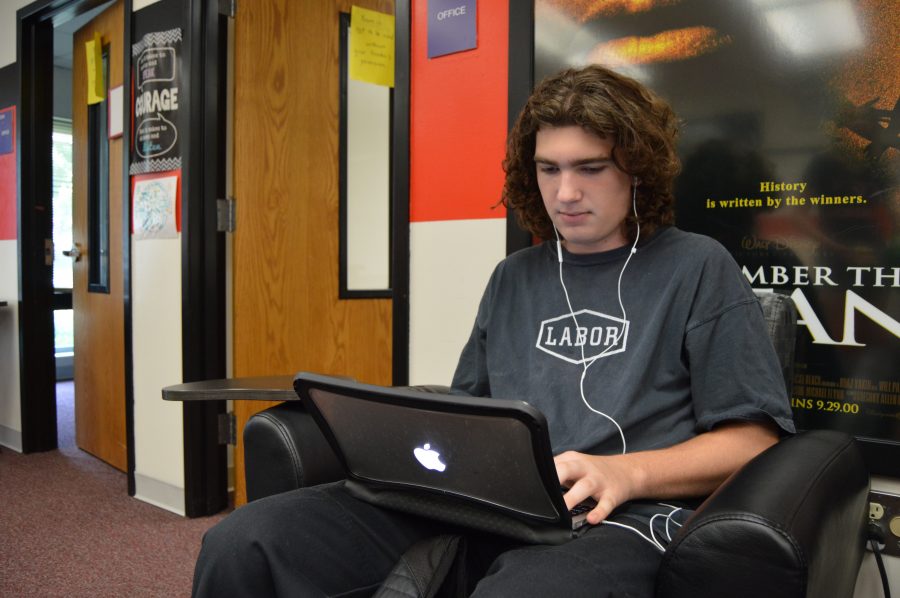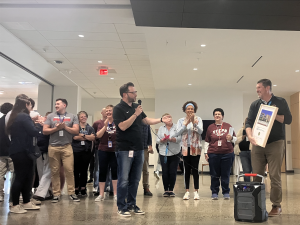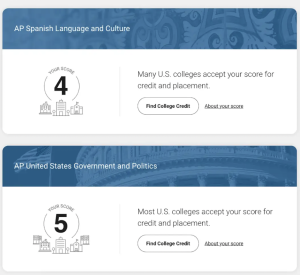Online classes…really?
September 2, 2018
 “Unpopular Opinions” are exactly that. These opinions are those of the authors alone, and do not represent the opinions of The Lasso or of George Mason High School.
“Unpopular Opinions” are exactly that. These opinions are those of the authors alone, and do not represent the opinions of The Lasso or of George Mason High School.
Online classes aren’t for everybody |
Online learning prepares you for the future |
 By Sarah Lambert By Sarah Lambert
I have always had trouble focusing on schoolwork. I’ve found I need to be constantly reminded by teachers to stay on task and to focus on the material being taught. When I was told as a rising freshman that an online class is required to graduate, I was somewhat panicked — would I be able to stay self-motivated enough to succeed? Many students at George Mason are taking advantage of our Hy-C program. Currently, about half the student body takes some sort of online hybrid course, with most taking Economics or Personal Finance. And the demand for online classes is only growing. I won’t deny that there are many perks to the program. Online courses allow students to have a more flexible day and to adapt their learning around out-of-school activities such as athletics. Also, the Hy-C program at Mason is very well developed and the teachers are able to tailor the program to a specific student. The program allows students to get ahead or adjust based on their own learning styles. For Leah Kleinberg, who graduated in 2018, the Hy-C program proved to be very useful and convenient. “There were other classes I wanted to take in school and this was really easy because it fulfilled two graduation requirements in one,” she said. Students that moved here as upperclassmen and needed requirements gained in ninth or tenth grade typically like this program because they don’t feel comfortable taking a class where everybody is younger than them. Ivy Renner, who also graduated in 2018, took a government class online, found this to be true. “I would have taken the actual class in tenth grade, but not now. I don’t want to be in a class with tenth graders,” she said. However, one big problem that I found was that Hy-C requires a lot of focus and discipline. The computer is a wonderful tool, but it also one of my greatest distractions. I need a solid time dedicated to school and homework. If I don’t have that, I am bound to go off task. When I visited the Hy-C room, it was clear this tendency to procrastinate is also true for many other students. Many students (especially upperclassmen) use Hy-C time to take a break. This is a suitable option for some students if they are diligent enough to make up work outside of school, but for many students like me, this cycle of delaying work can lead to the work just never being completed. Students can be enrolled in the same online course for years due to procrastination and lack of motivation. In addition, the question arises of whether or not the program is as good as an actual classroom with a real teacher. I know that for me, as well as many other students, it wouldn’t be. Sophomore Isabelle Anderson was considering taking online Geometry over the summer to get ahead, but decided against it. “I feel like its low budget math. I wouldn’t be as focused, and I wouldn’t really learn the material.” Many students require hands-on teaching, especially for courses with which they struggle. Talking to a teacher may sometimes be difficult with the Hybrid program. Mr. Jon Pepper, a Hy-C science teacher, noted that if students need help in a course while outside of school, making up work, or something like that, they have to email their teacher, who may take some time to respond. In the regular classroom setting, you can visit teachers easily during mustang block, study hall, or lunch. I understand that as schools become more technology dependent, the ability of students to comfortably use technology will be integral to their success. And I don’t want to stand in the way of innovation. However, this kind of extreme change to this way of learning that completely removes the teacher from the experience can be hard on students. There’s no doubt that our generation will need to learn to be flexible and adaptable lifelong learners. While online education may still be in its youth, the evidence seems clear that online classes are a valuable tool for our future, and I am excited to see the Hy-C program at Mason flourish. However, at this stage, I feel it is not developed enough to be suitable for a graduation requirement. Students who flourish in this kind of environment should continue taking online classes, but it is not a method of learning suited to all students‘ needs. |
 By Miles Lankford By Miles Lankford
Until recently, I’ve been a snob when it comes to online learning. Despite the growing audience for this type of education, I thought taking a course online had less value than the traditional classroom experience because the teaching methods were simply not as developed. Then I had a revelation. When I saw a post on Schoology about an online aerospace (Virginia Aerospace Science and Technology Scholars) program for students run by the Virginia Space Grant Consortium, it kind of hit me that I could take advantage of an opportunity to explore an area of academic and career interest that I might otherwise not have had. I decided to apply and was selected to participate in the VASTS program which includes lesson modules, research assignments, simulations, discussion forums, and a final project. I’ve found that taking the online course is useful for many reasons, including providing an opportunity to explore an academic interest in a hands-on manner not offered at Mason. The discipline of completing the assignments on the deadline, on top of my Mason academic workload, has improved my time-management skills. Finally, the experience is giving me skills that will be useful in college, as online learning is becoming more common as companion to formal classroom learning. My positive experience has given me a completely different view about the value of online learning, as well as sparked an interest in the future of online education in a rapidly changing information world. According to Ray Schroeder, associate vice chancellor for online learning at the university of Illinois, Springfield, “It is projected that those entering the workforce today will pursue four or five different careers (not just jobs) over their lifetime. These career changes will require retooling, training and education. The adult learners will not be able to visit physical campuses to access this learning; they will learn online.” Senior Max Ashton takes online HY-C personal finance that is through the school and holds similar views as Rex that online courses are “an easy and convenient way to learn important information.” All students at George Mason have access to these popular HY-C classes and can reap the rewards that come with them. One obvious example is that you lose the opportunity for discussion and interaction that are part of a typical classroom setting, since most online courses are individually completed. Next, for some students the responsibility could be harder to manage if the course is left to the student to decide when to do the work. As teenagers, our time management skills are still developing because we have had our parents/teachers to set up schedules upon which we complete our work. The ability to complete online courses on your own time could be a blessing or a curse — depending on the motivation of the student. Another disadvantage is that technology failures are often more common than a teacher being sick and not showing up to school, which means the risk of missing out on the education is higher with online learning than a traditional school setting. |









